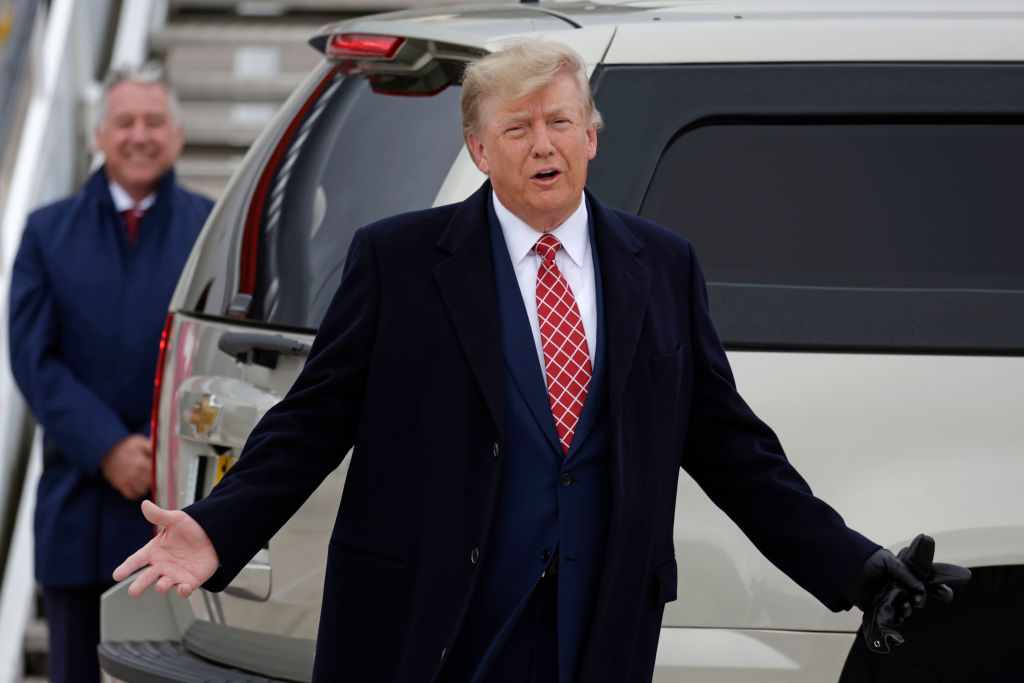Add Illinois to the list of states that have removed former President Donald Trump from the 2024 presidential ballot over his involvement in the Jan. 6, 2021, incursion at the U.S. Capitol.
Judge Tracie R. Porter issued the memorandum of judgment and order Wednesday, finding that Trump’s alleged involvement in “insurrection or rebellion” against the United States disqualified him from serving as president under the 14th Amendment to the Constitution.
“The Illinois State Board of Election shall remove Donald J. Trump from the ballot for the General Primary Election on March 19, 2024, or cause any votes cast for him to be suppressed, according to the procedures within their administrative authority,” she wrote.
However, Porter also stayed the order on the assumption that the Trump campaign would appeal it.
She also stayed it “if the United States Supreme Court in Anderson v. Griswold enters a decision inconsistent with this Order,” the document states [emphasis original].
Trump campaign spokesman Steven Cheung told Axios in an email that the campaign would “quickly appeal” what he described as Porter’s “unconstitutional ruling.”
“Today, an activist Democrat judge in Illinois summarily overruled the state’s board of elections and contradicted earlier decisions from dozens of other state and federal jurisdictions,” he said.
Axios noted that Porter had reviewed the findings of the Colorado Supreme Court and found them “compelling.”
The U.S. Supreme Court, however is currently reviewing that decision, and during arguments on Feb. 8 justices from both ideological wings of the nation’s highest court appeared to find Colorado’s position less “compelling” than did Porter, as numerous outlets reported at the time.
“What’s a state doing deciding who other citizens get to vote for for president?” Justice Elana Kagan, a nominee of former President Barack Obama, asked during those arguments, according to an Axios article.
Chief Justice John Roberts said that the result of Colorado’s decision is that any state could essentially remove any candidate from any ballot.
“It’ll come down to just a handful of states that are going to decide the presidential election,” he said, according to the outlet. “That’s a pretty daunting consequence.”
Justice Samuel Alito was more direct, stating that such a decision was likely to turn national elections into an “unmanageable situation.”
You can read the entire memorandum of judgment and order, including the appendices, below.
Memorandum of Judgment and Order by The Western Journal on Scribd
Section 3 of the 14th Amendment states: “No person shall be a Senator or Representative in Congress, or elector of President and Vice-President, or hold any office, civil or military, under the United States, or under any State, who, having previously taken an oath, as a member of Congress, or as an officer of the United States, or as a member of any State legislature, or as an executive or judicial officer of any State, to support the Constitution of the United States, shall have engaged in insurrection or rebellion against the same, or given aid or comfort to the enemies thereof.”
It also adds a provision for the restoration of such an individual’s ability to serve in office if both houses of Congress vote to do so with a two-thirds majority.
Experts have argued that the 14th Amendment doesn’t apply to the presidency, as that office is not named in the amendment and the president was never intended to be considered an “officer of the United States” by its authors.
Even liberal SCOTUS Justice Ketanji Brown Jackson asked during the Feb. 8 arguments whether the 14th Amendment applies to the presidency.
Typically, the Supreme Court issues ruling about three months after hearing arguments, but The New York Times suggested earlier this month that Anderson v. Griswold was a special case.
In such a case, “the nation can expect a prompt ruling,” the Times said, suggesting that it might even come before the March 5 “Super Tuesday” primary voting, on which 15 states — including Colorado — hold their primaries.
The court-watching SCOTUSblog, however, while agreeing that the court is “likely to act relatively quickly to resolve the issue because of its significance for other states where challenges to his eligibility are pending,” also said that’s a probability, not a given.
“There is no way to know when the justices will issue their decision,” the outlet concluded.
This article appeared originally on The Western Journal.

























 Continue with Google
Continue with Google